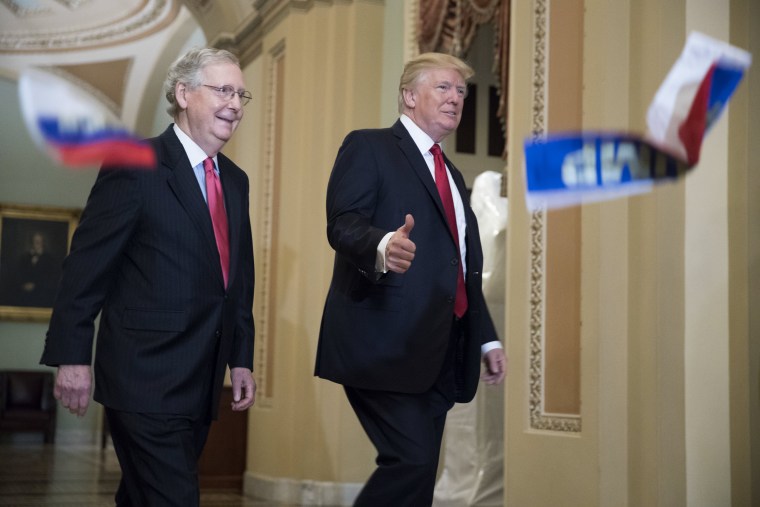Donald Trump insisted again yesterday that Barack Obama "did nothing" about the threat posed by Russia's attack on U.S. elections in 2016. This is an odd thing for the Republican president to say.
After all, Trump -- the direct beneficiary of Moscow's intelligence operation -- has spent the better part of two years pretending Russia wasn't responsible for the attack; he's done nothing to punish Russia for its intervention in our elections; and he hasn't taken steps to protect us from further attacks.
But of particular interest is the idea that Trump's predecessor sat on his hands and let the intervention happen. There's certainly room for debate about whether Obama could have gone further, but it's factually wrong to say he "did nothing." What the Democratic president did was try to generate bipartisan support for an American response to a foreign attack -- which did not happen in large part because Senate Majority Leader Mitch McConnell didn't want it to.
Republican strategist John Weaver, who helped run John McCain's and John Kasich's presidential campaigns, said over the weekend that it's time to "revisit why [McConnell] refused to join [Obama] in warning America the Russians had attacked us." Former Vice President Joe Biden recently raised related concerns.
Former Vice President Joe Biden says he and President Barack Obama decided not to speak out publicly on Russian interference during the 2016 campaign after Senate Majority Leader Mitch McConnell refused to sign a bipartisan statement condemning the Kremlin's role.Speaking on Tuesday at the Council on Foreign Relations, Biden said the Obama administration sought a united front to dispel concerns that going public with such accusations would be seen as an effort to undermine the legitimacy of the election.However, McConnell "wanted no part of having a bipartisan commitment saying, essentially, 'Russia's doing this. Stop,' " he said.
I'm glad this comes up from time to time, because it's an under-appreciated part of the larger controversy.
As recently as July, NBC News' Kasie Hunt asked McConnell if he regrets the way he handled the threat at the time. The Senate GOP leader responded by dodging the question entirely.
And that's a shame because McConnell owes the public a better answer.
As regular readers know, the Obama White House, swayed by the evidence compiled by U.S. intelligence agencies, wanted bipartisan support to push back against Russian intrusion, and in mid-September 2016, the then-president dispatched counterterrorism adviser Lisa Monaco, then-FBI Director James Comey, and then-Homeland Security Secretary Jeh Johnson to brief top members of Congress.
Obama didn’t want to be seen as using intelligence for partisan or electoral ends, so he sought a “show of solidarity and bipartisan unity” against foreign manipulation of our democracy.
That didn’t happen – because McConnel refused. The Washington Post reported:
In early September, Johnson, Comey, and Monaco arrived on Capitol Hill in a caravan of black SUVs for a meeting with 12 key members of Congress, including the leadership of both parties. The meeting devolved into a partisan squabble.“The Dems were, ‘Hey, we have to tell the public,’ ” recalled one participant. But Republicans resisted, arguing that to warn the public that the election was under attack would further Russia’s aim of sapping confidence in the system.Senate Majority Leader Mitch McConnell (R-Ky.) went further, officials said, voicing skepticism that the underlying intelligence truly supported the White House’s claims.
As Brian Beutler put it, “McConnell ran interference for Trump during the campaign to stop Obama from warning the country about things Trump was lying publicly about.”
By way of a defense, McConnell's office has pointed to a September 2016 letter, signed by congressional leaders from both parties, and sent to the president of the National Association of State Election Directors. It warned state officials about possible hacking efforts.
And while that was nice, this isn't the statement American intelligence officials wanted McConnell to endorse, and the letter made no reference to Russia's attack, which McConnell was briefed on at the time.
It's hardly outrageous to connect the dots -- McConnell balked because his partisan ambitions outweighed every other consideration -- but there's still value in hearing the Kentucky Republican offer some kind of explanation for his conduct.
